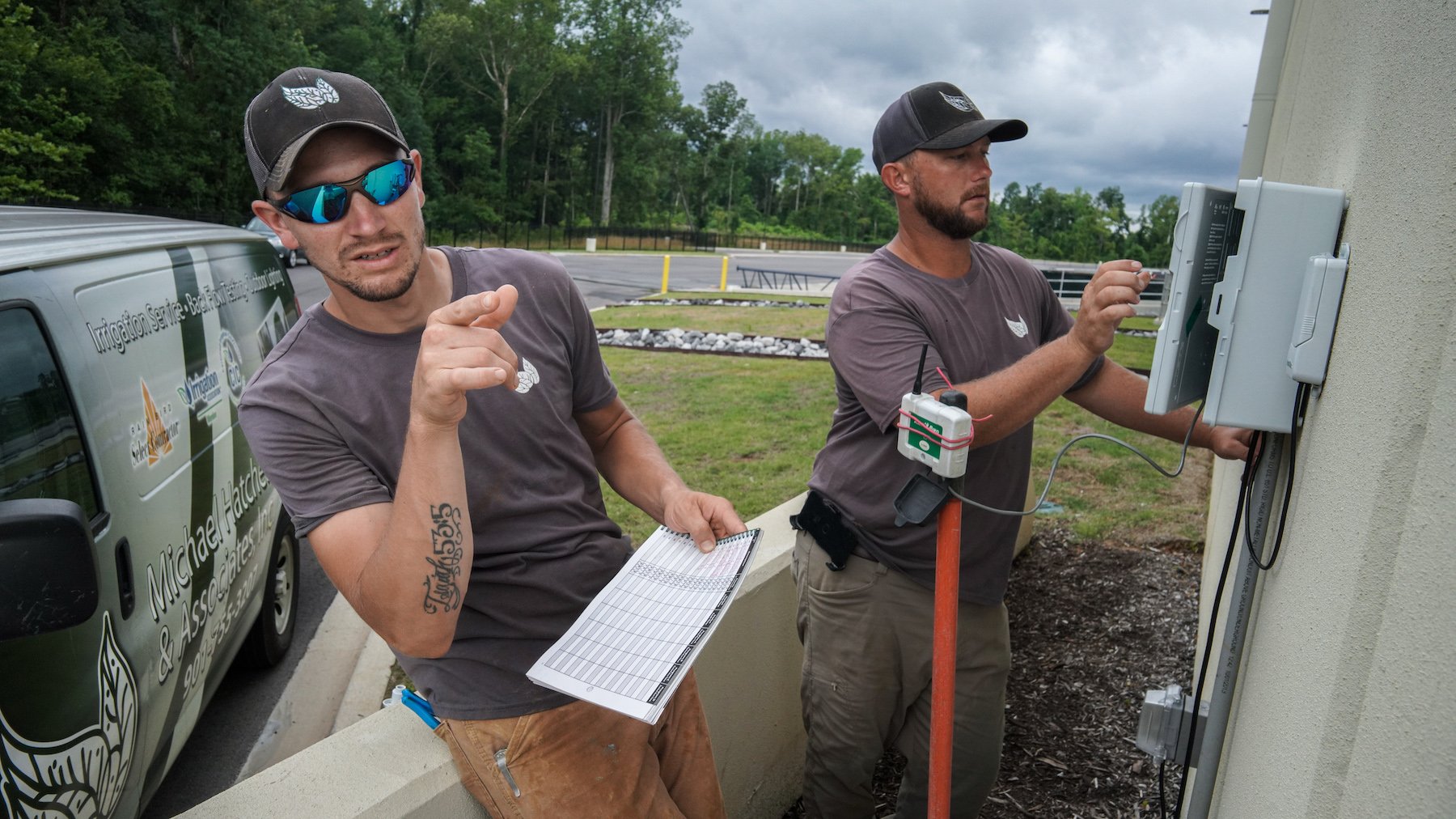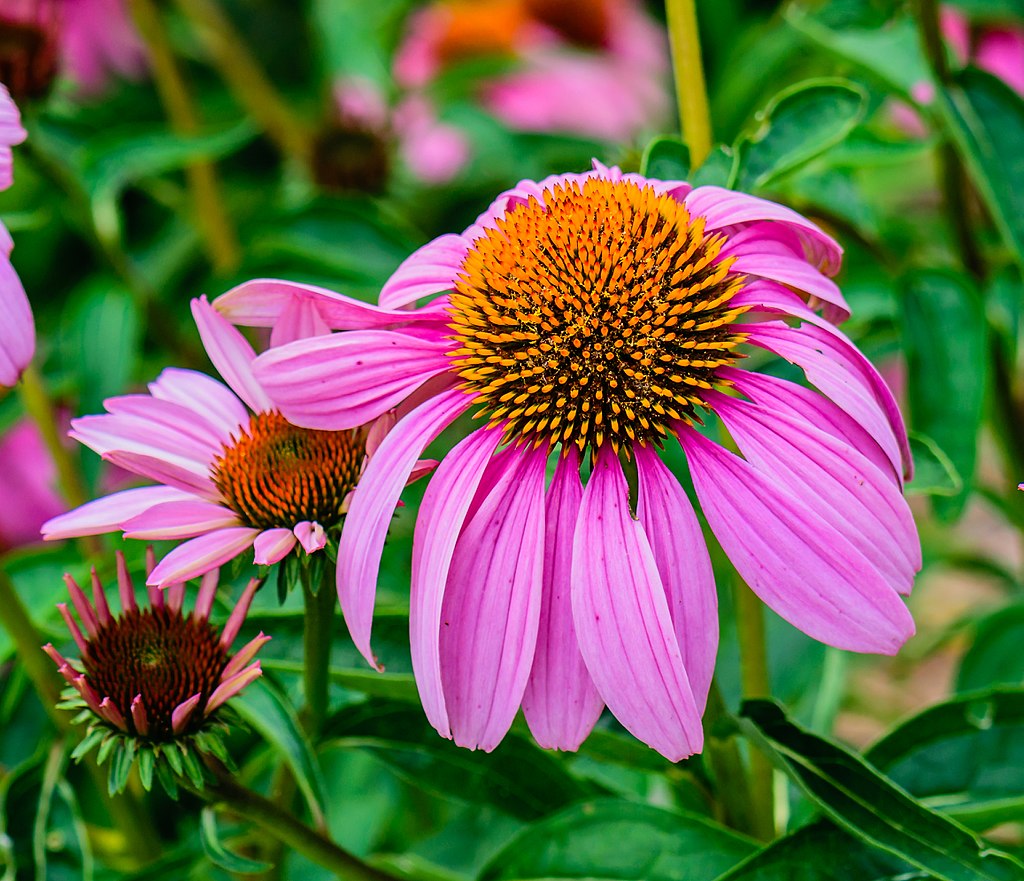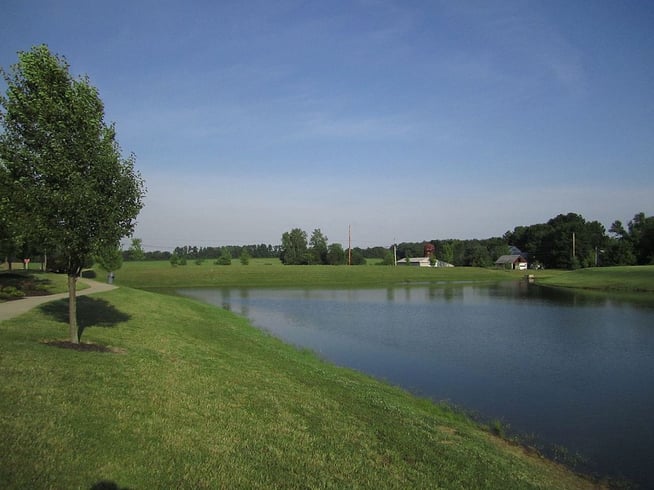Warehouse and industrial park landscaping is tough, but it’s not perfect.
These hard-working properties have their own unique set of challenges as they host huge trucks, endure tough weather conditions, and are home to vast expanses of concrete.
Luckily, the problems all have solutions.
Let’s take a look.
1. Runoff and Erosion Problems
Lots of pavement seems like low maintenance, but it brings its own issue: water runs off of it, not through it.
And that causes some water-related challenges:
Water often washes away the dirt at the edges of pavement. Parking lots can actually sink, and big holes develop where water washed soil out underneath.
- Water pollution. Pavement collects all kinds of pollutants: oil from vehicles, nitrogen oxides from car exhaust, bits of rubber from tires, phosphates from fertilizers, spilled antifreeze. These pollutants can’t seep through a solid pavement surface, so they quickly end up flowing from your property right into the groundwater and nearby lakes and streams, threatening wildlife.
- Flash flooding. When heavy rain has nowhere to go but pavement, it can quickly trigger flooding. Water runoff from an acre of pavement is 10 to 20 times greater than the runoff from an acre of grass.
- Excess water dangers. Damaged, buckled concrete or asphalt is a trip hazard, which means it’s a liability issue for you.
The good news? There are several solutions for wayward water on large paved areas, including concrete swales, rain gardens, retention basins, or re-grading low spots.
Address any problems sooner rather than later and you’ll avoid insurance issues and expensive repair bills.
And you won’t have to stress out when heavy rain hits.
2. Snow and Ice Management
Big parking lots means lots of high-risk liability areas in the winter if snow and ice coat the pavement.
They have to stay clear, both for employees who walk between their cars and buildings and for the many trucks that make deliveries.
High-priority areas like the truck gate area, loading docks, and entrances need close attention.
Brine is a must-use tool when conditions call for it, to prevent snow and ice from sticking.
Refreeze is a big issue here in the mid-South, with rapidly changing temperatures. Sun and warming temperatures often melt ice the next day, but when the temperature dips below freezing again at night any pooled water left refreezes, creating a brand-new hazard.
3. Irrigation Repairs
Warehouse and industrial park landscaping typically includes large expanses of pavement, but it also often has large areas of lawn.
If your property has an irrigation system, that means lots of hard-working sprinkler heads, valves, and expansive lines that need occasional repair.
Irrigation heads get clogged or broken, keeping water from spraying properly. Or they get knocked out of alignment by mowers, snowplows, or heavy foot traffic.
Valves get stuck. Lines can leak.
The best way to prevent expensive repairs is monthly irrigation inspections.
During these inspections, technicians check everything over, testing each irrigation zone to make sure the right amount of water is hitting all the right places, with no waste. They’re on the lookout for leaks, breaks, or wayward sprinkler heads. 
Preventive maintenance can save water — and money — by spotting and repairing potential problems before they become expensive disasters.
If our irrigation techs see something amiss during a monthly inspection, they can often take care of it right there on the spot.
4. Truck Troubles in Warehouse and Industrial Park Landscaping
Drivers of huge 18-wheelers are on a mission when they rumble in and out of industrial parks — and it isn’t about the landscaping.
Making turns can be tricky. They often hit fences and careen over corner landscaping.
Strategic landscape design can help drivers steer clear. It’s sometimes as simple as a well-placed boulder.
5. Struggling Plants in Warehouse and Industrial Park Landscaping
Let’s face it, an industrial park isn’t exactly a rose garden.
Plants that grow on these dry, sunny, high-traffic properties have to be tough.
If the right plants aren’t installed in the first place, they’ll wither and die — not exactly the first impression you had in mind.
So choosing tough, drought-tolerant, low-maintenance plant material for warehouse and industrial park landscape design is crucial.
Native plants are perfect.
Once established, native plants need less water. They naturally resist diseases and pests. That means you don’t have to worry about plants getting eaten, looking bad, and needing to be replaced.
Native plants love where they’re planted. They’re from around here.
- Sturdy, long-flowering perennials like Black-eyed Susans add a burst of color but need little maintenance.
- The stunning purple petals and rich gold centers of Purple Coneflower are as impressive as any fussier flower, but thrive in your landscape with very little maintenance, hanging tough June through August.
- Eastern Red Cedar is the official state evergreen tree of Tennessee, adds an attractive greenish-blue color to your landscape, and happily grows just about anywhere. And it can live for more than 900 years, so it’s not going anywhere. Well, unless an 18-wheeler hits it.
6. Detention and Retention Pond Maintenance
Stormwater ponds are common fixtures in warehouse and industrial park landscaping.
Retention and detention ponds collect water and release it slowly, at a nice, easy rate that prevents flooding or erosion.
But they require attention and regular maintenance to keep them working properly. 
If they get clogged by trash, debris, or weeds, they won’t drain well.
Erosion can take a toll, too. Excess water can erode the pond edges, compromising how well the retention basin works.
Weeds, cattails, and other invasive plants can block water flow and crowd out beneficial greenery.
Avoid a Host of Headaches
If you’re managing a sprawling warehouse or industrial park, you have a lot on your plate.
You don’t need landscaping worries raising your blood pressure.
You don’t want dead plants giving your company a bad name. You don’t need the hassle of a clogged detention pond full of floating trash. You don’t need a flooded parking lot, irrigation heads spraying pedestrians, or employees slipping on slick ice.
Watch This Video to Learn How We Help Industrial & Warehouse Properties
Trust Your Warehouse and Industrial Park Landscaping to Hatcher
Here at Michael Hatcher & Associates, we know industrial parks and warehouses have a set of unique landscaping needs.
Expansive lawns. Huge parking lots. Lots of truck traffic. A need for no-fuss landscaping that keeps the budget in mind.
Our skilled crews know the drill.
Ready to boost the appeal and safety of your commercial property? Talk to one of our commercial landscaping experts today! We’ll meet at your property, create a custom plan, and get you on your way to enjoying a beautiful, worry-free property.
Image Source: purple coneflower, retention pond

